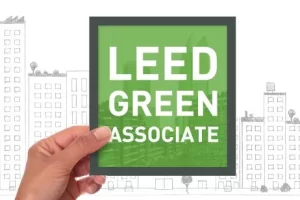The house, school, or office, etc. should not only provide comfort and security for its habitats but also contribute to their good health. It is important to know that the built environment can positively and negatively have great effects on the natural ecosystem and building occupants. A well-designed and constructed green building help in eliminating negative impacts on the environment and it also costs less to maintain.
USGBC helps you understand the need for green building projects, and equips you with the necessary skills to excel in it, providing you with an in-depth understanding of the various LEEDS Certifications. Before we get into the differences between LEED GA and AP, let us look at the basic terminologies related to USGBC Certification.
-
-
- USGBC – United States Green Building Council
- LEED – Leadership in Energy and Environmental Design
- GA – Green Associate
- AP – Accredited Professional
-
Let Us Now Try To Understand What These Terminologies Mean?
USGBC – The world’s premier institution that awards professional certifications in the field of Green Building.
LEED – The international de-facto green building rating system that many countries in the world have adopted.
LEED GA – The foundational certification that demonstrates general knowledge of the green building rating system and awarded to professionals who have passed the examination. Click here to learn more about the LEED GA Exam.
LEED AP – The advanced certification that offers in-depth knowledge in green building practices. You can acquire LEED AP certification once you have successfully completed your LEED GA Exam.
LEED AP Has 5 Different Specialties Which You Can Choose From According To Your Profession:
1. LEED BD+C (Building Design and Construction)
2. LEED O+M (Operations and Maintenance)
3. LEED ID+C (Interior Design and Construction)
4. LEED ND (Neighborhood Development)
5. LEED Homes
Difference between LEED GA and LEED AP
| SPECIFICS | LEED GA | LEED AP (BD+C) |
| Experience Requirement | None | None |
| Prerequisite | None | LEED GA (LEED GA and AP Exam can be taken together). Click here to learn more about this. |
| Number of Questions | 100 | 100 |
| Question type | MCQ | MCQ |
| Exam Fee | $250 | $350 |
| Certification Cycle | 2 Years | 2 Years |
| Recertification Requirements |
Every two years, you need 15 hours of continuing education activity to maintain your credential. To know more details on maintaining your credential, click this link for USGBC Video |
Every two years, you need 30 hours of continuing education activity to maintain your credential. To know more details on maintaining your credential, click this link for USGBC Video |
Which LEED is suitable for you?
As mentioned earlier, LEED GA is the foundational certification that provides general knowledge of the green building rating system. It is advised to begin with LEED GA as it is a prerequisite for LEED AP. If you choose to appear for the AP exam without the GA, you will have to take the Combo Exam (LEED GA and LEED AP).
Should you stop with GA or pursue AP as well?
A key difference between LEED GA and LEED AP is LEED GA is a foundational course that introduces you to the USGBC LEED Rating System, while LEED AP is the advanced certification that provides vast knowledge in green building practices.
Note: Despite the difference between LEED GA and LEED AP, it is essential to get professional certification in specific areas if you would like to become a professional in Green Building. For example, one of the most popular LEED AP specializations is Building Design and Construction.
Considering this, 3FOLD Training is offering LEED GA and AP (BD+C) Combo training. In this training, you will complete the necessary topics to pass both the certification examination sequentially, i.e. You will complete GA and then appear for the AP. Alternatively, you can also appear for the Combo Exam (i.e. you will take both GA and AP simultaneously).
I hope you found this article on the difference between LEED GA and LEED AP was helpful? For our upcoming batches for the LEED GA and AP Combo, please visit our USGBC course page on this link.






2 Comments
Leave your reply.